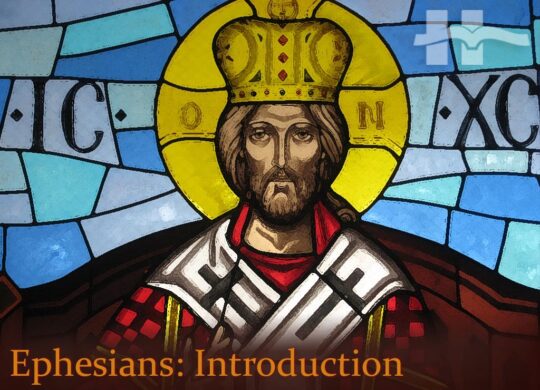Ephesians: Introduction

This is the first in a series of posts on each pericope of Ephesians, essentially a distillation of what is in my Ephesians commentary (more on that here).
The theme of Ephesians is clearly established early on in 1:9–10.
… the consummation of all things in Christ—
the things in the heavens and the things on the earth in Him.
Ephesians 1:8–10
God’s plan, his “administration/working out of the fullness/completion of time,” is to “consummate/bring together/unify all things in Christ,” in the entirety of the cosmos! And perhaps no less striking is the fact that God’s people are part of this vast and glorious drama. Human history, particularly of the people of God, is the arena for a cosmic battle: God vs. the forces of evil opposed to his consummation of all things in Christ. If the children of God ever feel their lives are insignificant, they need to take note of Ephesians: they are the agents of the manifestation of divine victory in the cosmos. Indeed, their victories in spiritual battles redound to God’s victory and thereby his glory.
1. Ephesians 1:1–14. The curtain is raised on God’s grand and glorious plan for the cosmos—the consummation of all things in Christ. Into this grand and glorious plan, all (believing) humans have been recruited.
2. Ephesians 1:15–23. Divine power—involved in the exaltation of Christ over death and every inimical power in the universe—is working on behalf of the body Christ, the expression of his divine rule in the cosmos.
3. Ephesians 2:1–10. Once lost in sin and deserving only of the wrath of God, Christians have now been saved by grace through faith, for sanctification by good works.
4. Ephesians 2:11–22. From all humanity, those who were once unbelievers, have been brought in by faith into the community of God’s people, reconciled to God, and are now becoming a holy temple, a dwelling of God.
5. Ephesians 3:1–13. Paul’s paradoxical role—one “less than the least” being greatly used by God—is the paradigm for all believers: God accomplishes his grand plan through seemingly insignificant people.
6. Ephesians 3:14–21. God’s plan is being worked out as believers in community comprehend the magnitude of Christ’s love for them, and thus God is glorified in the church.
7. Ephesians 4:1–16. Christians are called to selfless love that leads to unity in the body, and they are to exercise the grace-gifts given to them by Christ, to build the church up in unity and maturity.
8. Ephesians 4:17–32. Believers, no longer living licentiously, are being divinely renewed in the likeness of God, and they manifest that divine character as they engage in community-building activities.
9. Ephesians 5:1–20. The imitation of God and of Christ’s selfless love calls for being filled by the Spirit and the adoption of a lifestyle that is wise and worshipful, inviting the pleasure of God.
10. Ephesians 5:21–33. The fullness of God in the church is manifested in the mutual submission of believers, including the modeling of spousal relationships after that between Christ and the church.
11. Ephesians 6:1–9. The responsibilities of those in authority and those under authority involves mutual respect and submission, leading to appropriate rewards on the future on the day of reckoning.
12. Ephesians 6:10–24. Victory against supernatural anti-God foes can be achieved only by divine empowerment, and by constant, alert, Spirit-driven prayer for all the saints.
Over the weeks and months to come, I’ll expand on each of these ….











 Abe Kuruvilla is the Carl E. Bates Professor of Christian Preaching at The Southern Baptist Theological Seminary (Louisville, KY), and a dermatologist in private practice. His passion is to explore, explain, and exemplify preaching.
Abe Kuruvilla is the Carl E. Bates Professor of Christian Preaching at The Southern Baptist Theological Seminary (Louisville, KY), and a dermatologist in private practice. His passion is to explore, explain, and exemplify preaching.